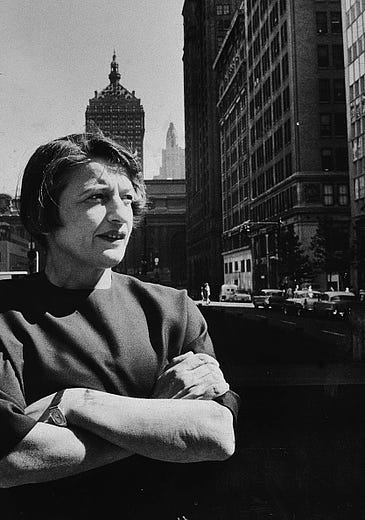|
 |
The Writer's Almanac from Friday, February 2, 2007
"The Past Is Still There" by Deborah Garrison, from The Second Child. © Random House.
It is the birthday of novelist and philosopher Ayn Rand, born Alissa Rosenbaum in St. Petersburg, Russia (1905). In 1917, she witnessed the first shots of the Russian Revolution from her balcony. A communist gang took over her father's shop, and her family was immediately reduced to poverty. After college, Rand worked as a guide in a historical museum, but when she got a visa to visit relatives in Chicago, she vowed never to return to Russia.
Within six months of living in America, Rand moved to Hollywood to become a screenwriter. She published her first screenplay in 1932, and that allowed her to work on novels in her spare time. Her first important novel was that novel she'd planned to write about skyscrapers: The Fountainhead (1943), about a brilliant architect named Howard Roark who blows up a housing project he built because his design was corrupted by the influence others. When he is put on trial, he explains his philosophy that, in order to achieve greatness, individuals have to be allowed to realize their own personal vision, and not be tied down by the concerns of society. These ideas became the basis of Rand's philosophy, called Objectivism, which she also explored in her novel Atlas Shrugged (1957).
It's the birthday of James Joyce, born in Rathgar, Ireland, just outside Dublin (1882). He's best known today for Ulysses (1922), his attempt to recreate a single day in the city of Dublin, with all its sights, sounds, smells, as well as the many different kinds of people, the way they talked, and what private thoughts floated through their heads as they went about their daily lives.
He wrote the novel while living in voluntary exile in Zurich, and he did all kinds of research to get the details right. He asked his Aunt Josephine to send him copies of anything to do with Ireland: newspapers, magazines, history books, guidebooks, maps, and photographs. Because he chose June 16, 1904 as the day on which the novel would take place, he made sure to include real details about things that had happened on that day, including sporting events, news items, and even newspaper advertisements that appeared in newspapers on that day.
The first printing of Ulysses, of one thousand copies, came out on this day, Joyce's birthday, in 1922. It tells the story of two Dublin men — a young aspiring writer named Stephen Dedalus, and Leopold Bloom, a middle-aged Jewish man whose wife is cheating on him. The two men go about their daily business, and finally meet each other at the end of the day. Years later, the novelist Vladimir Nabokov would force his students to study a map of Dublin and trace the characters' movements along the map while reading the novel, to demonstrate Joyce's rigorous attention to reality.
Part of what made Ulysses so revolutionary was that Joyce chose to write almost every chapter in a different style. There's a chapter in a newspaper office that is broken up into short sections with newspaper headlines; there's a chapter, from the point of view of a young woman on a beach, written in the style of a romance novel; there's a chapter written like a play, complete with stage directions, and there's a chapter that consists entirely of questions and answers.
It took him 17 years to write his next book, Finnegans Wake (1939), which is now considered possibly the most radical and difficult book ever published. Instead of writing it in ordinary English, he wrote the book in his own invented language, full of multilingual puns and hybrid words, snippets of nursery rhymes and songs, allusions to history and mythology, and sometimes pure nonsense.
Many people, even Joyce scholars, consider it unreadable. At one point, in the middle of the book, Joyce himself writes to the reader, "You is feeling like you was lost in the bush, boy? You says: It is a puling sample jungle of woods. You most shouts out: Bethicket me for a stump of beech if I have the poultriest notions what the farest he all means."
Be well, do good work, and keep in touch.®
Find the NEW weekly Garrison Keillor's Podcast on:
If you are a paid subscriber to The Writer's Almanac with Garrison Keillor, thank you! Your financial support is used to maintain these newsletters, websites, and archive. If you’re not yet a paid subscriber and would like to become one, support can be made through our garrisonkeillor.com store, by check to Prairie Home Productions, P.O. Box 2090, Minneapolis, MN 55402, or by clicking the SUBSCRIBE button. This financial support is not tax deductible.


